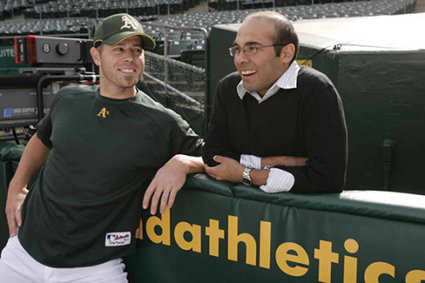MIT Alumnus Named General Manager of the Los Angeles Dodgers
-
-
slice.mit.edu
- 1
Filed Under
Recommended

Each year, the MIT Sloan Sports Analytics Conference highlights the importance of data analytics, and as a result, the growing numbers of MIT alumni working the front office of professional sports teams.
The list of MIT alumni who serve as high-level decision makers include Daryl Morey MBA ’00, the SSAC co-founder and general manager the NBA’s Houston Rockets, and Brian Bilello ’97, president of Major League Soccer’s New England Revolution.
Add Farhan Zaidi ’98 to the list. Earlier this month, Zaidi was named the new general manager of baseball’s Los Angeles Dodgers, a storied franchise newly dedicated to statistic-minded analysis and strategy.
According to the New York Times, the hiring of Zaidi, who spent 10 years in the front office of the Oakland Athletics, is being regarded as part of a growing trend in which statistic-minded executives are taking larger roles in the decision-making process. The Oakland organization—which was profiled in the movie Moneyball—is regarded as a pioneer in using data analysis to develop sports strategy.
Zaidi, who was previously profiled by MIT Technology Review, grew up in the Philippines. At MIT, he studied public finance and development economics, and led the undergraduate economics association.
"With the A’s, Zaidi (did) statistical analysis to evaluate and target new players and trade prospects, almost as if they were equity assets. ‘I still use Stata, the statistical program I used as an undergrad,’" MIT Technology Review wrote. "More important, he uses the critical-thinking skills he honed at MIT."
‘There are good trades, bad trades,’ he says. ‘There will be times when you come out on the wrong end, but if you have the right process, you’re going to be right more times than you’re wrong.’”
Zaidi joins a Dodgers front office led by new President Andrew Friedman, who previously served as executive vice president for the Tampa Bay Rays, a team, like Oakland, that relied heavily on advanced statistical analysis.
Friedman and Zaidi—neither of whom have played professional baseball—are expected to take a data-driven approach to running the Dodgers, a sharp contrast to an organization that often relied on former players and coaches to make similar decisions.
“Front offices today are very balanced—traditional scouting backgrounds mixed with analytics backgrounds,” Zaidi ’98 told Slice of MIT earlier this year. “Much like MIT, sports now live in a very hypothesis-driven environment. You need to ask the right questions, accumulate the right data, and implement a strategy based on that data.”









Comments
Lawrence D. Poster
Wed, 11/19/2014 12:48pm
As a life-long Dodgers fan, I am thrilled that Farhan has joined the Dodgers to apply science and algorithms to improve the Dodgers.
Actually for my first few years I was a Yankee fan, but my grandfather who was founding head of the science department of Abraham Lincoln High School in Brooklyn and a resident of Flatbush, when he found out I favored the enemy successfully bribed me to switch allegiance to Brooklyn. If I did, he promised to take me to see 'Dem Bums, his favorite, in Ebbets Field. I immediately complied and never looked back. But I never did see the Dodgers live until they returned years later to play the Mets. Little at the time did I know (but my grandfather should have) that O'Malley would yank the Dodgers from Brooklyn and move them to L.A. But except for the lost year of '58, what a team the Dodgers became! What with Koufax and Drysdale, Maury Wills and Tommy Davis and Willie Davis, and Norm and Larry Sherry, even when they lost, they were the most exciting team not only in baseball but in all major league sports! Sneaking past the White Sox in the 1959 Series after enduring an 11-0 drubbing at the hands of Ted Kluszewski was only the beginning.
Farhan, you have joined a storied team!! Adding your keen statistical insights and adroit trading skills to the likes of Puig, Kemp, Kershaw and others - and the excitement of having one of our Institute's own in such a key role on the Club - can a Dodgers' World Series Win be far behind?
Now, if only Kershaw can figure out how to defeat St. Louis in the post-season.
Yours,
Lawrence D. Poster
MIT Class of '71